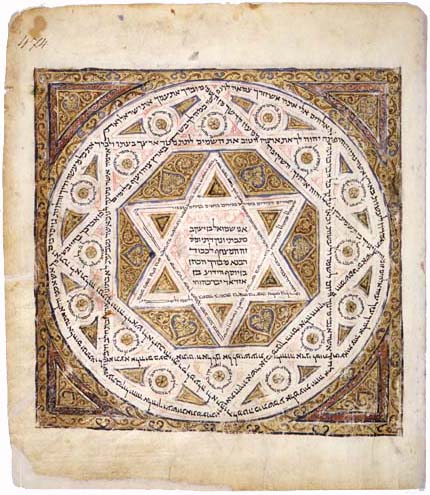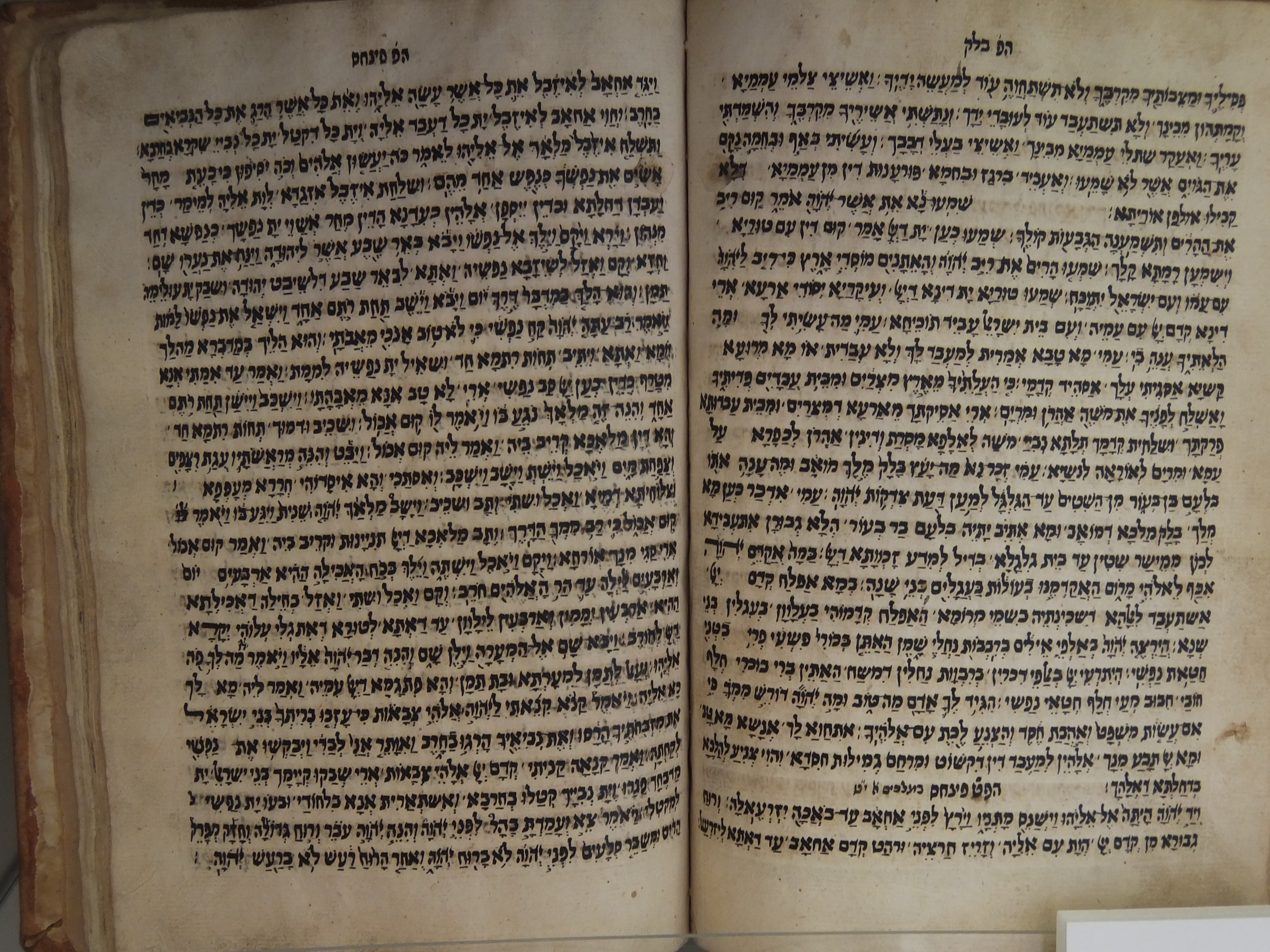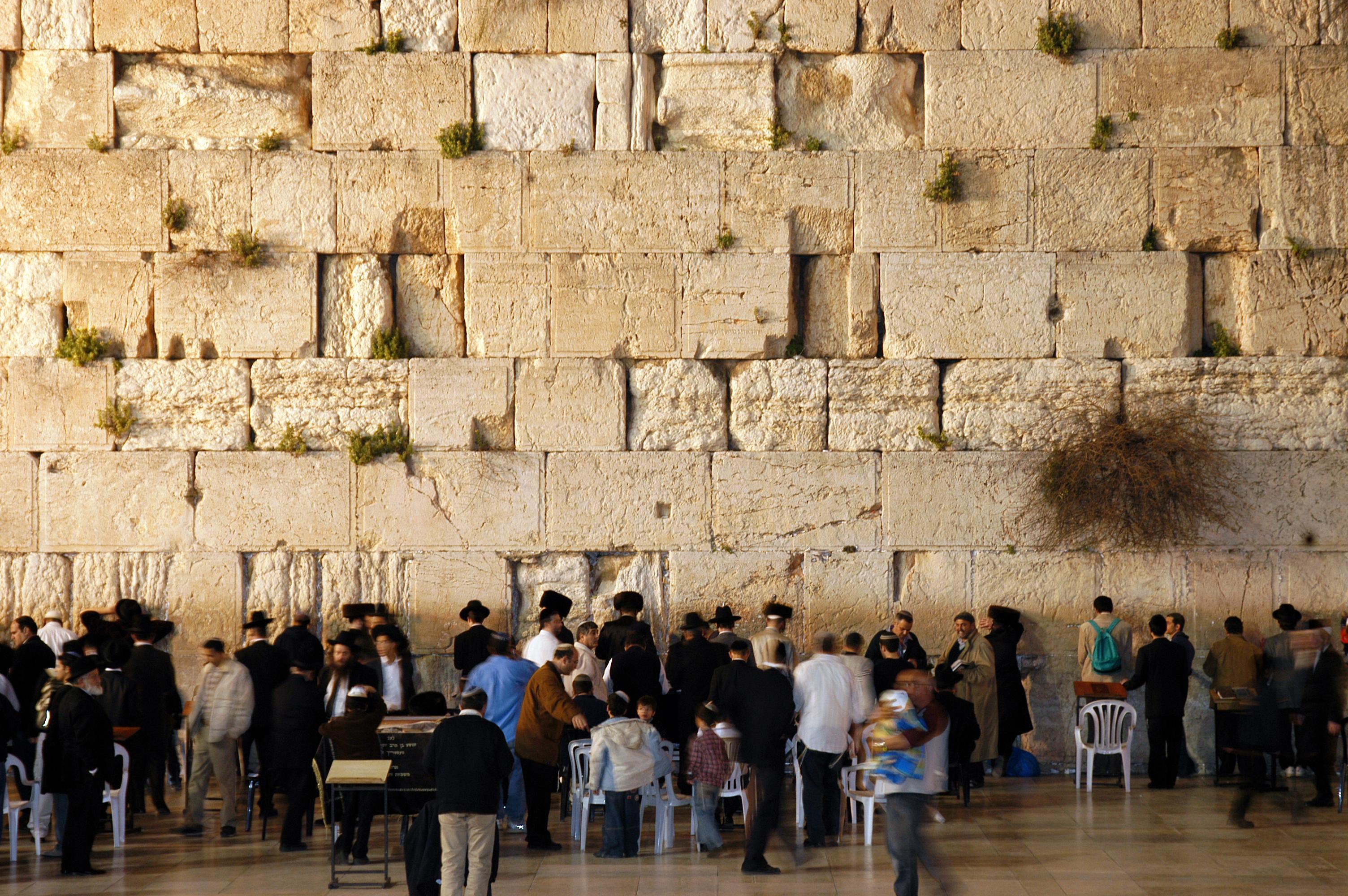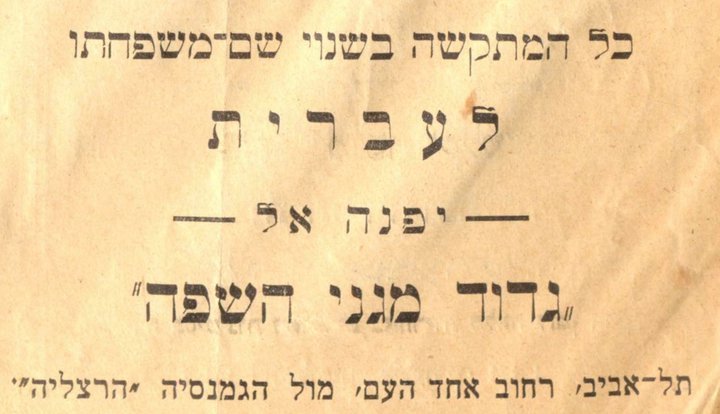|
Eliyahu Koren
Eliyahu Koren (Hebrew: אליהו קורן; July 23, 1907 — February 17, 2001) was a master typographer and graphic artist. After studying in Nuremberg, he immigrated to Mandatory Palestine in 1933. He served as head of the graphics department of Keren Kayemet, the Jewish National Fund, from 1936 to 1957. He founded Koren Publishers Jerusalem in 1961, which published the Koren Bible in 1962. He published the Koren Siddur in 1981, and various religious texts until his death. Biography Eliyahu Korngold (later Koren) was born in Nuremberg, Germany. He showed a rare artistic talent from an early age. After studying at the Gymnasium, Korngold attended the Kunstschule der Stadt Nurnberg, the city's School of Graphic and Applied Art, completing a six-year course of graphic art, applied art, and stained glass in three years. In 1933, when he was an assistant to a professor at the Kunstschule and a youth leader in the Ezra religious youth movement, Korngold read that Bavarian Jews were ... [...More Info...] [...Related Items...] OR: [Wikipedia] [Google] [Baidu] |
Hebrew Language
Hebrew (; ; ) is a Northwest Semitic language of the Afroasiatic language family. Historically, it is one of the spoken languages of the Israelites and their longest-surviving descendants, the Jews and Samaritans. It was largely preserved throughout history as the main liturgical language of Judaism (since the Second Temple period) and Samaritanism. Hebrew is the only Canaanite language still spoken today, and serves as the only truly successful example of a dead language that has been revived. It is also one of only two Northwest Semitic languages still in use, with the other being Aramaic. The earliest examples of written Paleo-Hebrew date back to the 10th century BCE. Nearly all of the Hebrew Bible is written in Biblical Hebrew, with much of its present form in the dialect that scholars believe flourished around the 6th century BCE, during the time of the Babylonian captivity. For this reason, Hebrew has been referred to by Jews as '' Lashon Hakodesh'' (, ) since an ... [...More Info...] [...Related Items...] OR: [Wikipedia] [Google] [Baidu] |
Umberto Cassuto
Umberto Cassuto, also known as Moshe David Cassuto (16 September 1883 – 19 December 1951), was an Italian historian, a rabbi, and a scholar of the Hebrew Bible and Ugaritic literature, in the University of Florence, then at the University of Rome La Sapienza. When the 1938 anti-Semitic Italian racial laws forced him from this position, he moved to the Hebrew University of Jerusalem. Early life and career Cassuto was born in Florence as the son of Gustavo and Ernesta Galletti in a traditionalist Jewish family. Cassuto studied there at the University of Florence (graduated in 1906), and the ''Collegio Rabbinico'' (ordained in 1908), where its principal Samuel Hirsch Margulies had a profound influence on him. After getting a degree and ''Semicha'', he taught at both institutions. From 1922 to 1925, he was Chief Rabbi of Florence. In 1925 he became professor of Hebrew and literature at the University of Florence and then took the chair of Hebrew language at the University of Rome ... [...More Info...] [...Related Items...] OR: [Wikipedia] [Google] [Baidu] |
Jacob Ben Hayyim Ibn Adonijah
Jacob ben Hayyim ben Isaac ibn Adonijah or Jacob ben Chayyim (c. 1470 – before 1538), was a scholar of the Masoretic Text, Masoretic textual notes on the Hebrew Bible, and printer (publisher), printer. Born in Tunis (hence sometimes called Tunisi), he left his native country to escape the persecutions that broke out there at the beginning of the sixteenth century. After residing at Rome and Florence he settled at Venice, where he was engaged as corrector of the Hebrew press of Daniel Bomberg. Late in life he embraced Christianity. Jacob's name is known chiefly in connection with his edition of the Rabbinical Bible (1524–25), which he supplied with Masoretic notes and an introduction which discusses the Masorah, Qere and Ketiv, ''qere'' and ''ketib'', and the discrepancies between the Talmudists and the Masorah. The value of his activity as a Masorite was recognized even by Elijah Levita, who, however, often finds fault with his selections. Jacob's introduction to the Rabbinical ... [...More Info...] [...Related Items...] OR: [Wikipedia] [Google] [Baidu] |
Aron Dotan
Aron may refer to: Characters *Aron (comics), from the Marvel Universe comic ''Aron! HyperSpace Boy!'' *Aron (Pokémon), in the ''Pokémon'' franchise * Aron Trask, from John Steinbeck's novel ''East of Eden'' *Áron or Aaron, the brother of Moses People *Aron (name), name origin, variants, people Geography *Aron (Loire), a river in central France *Aron (Mayenne), a tributary of the Mayenne in northwestern France *Aron, Mayenne, a commune in northwestern France *Aron, India, a town and ''nagar panchayat'' (settlement transitioning from rural to urban) See also *Aaron (other) *Aarons (other) Aarons may refer to: People * Aarons (surname), people with the surname * Jesse Aarons, fictional character in the book ''Bridge to Terabithia'' by Katherine Paterson * ''Aarons.'', author abbreviation for botanist Aaron Aaronsohn Places * Aa ... * Fanum d'Aron, a Romano-Celtic temple in Aurillac, Auvergne, France {{disambiguation, geo ... [...More Info...] [...Related Items...] OR: [Wikipedia] [Google] [Baidu] |
Masoretic Text
The Masoretic Text (MT or 𝕸; he, נֻסָּח הַמָּסוֹרָה, Nūssāḥ Hammāsōrā, lit. 'Text of the Tradition') is the authoritative Hebrew and Aramaic text of the 24 books of the Hebrew Bible (Tanakh) in Rabbinic Judaism. The Masoretic Text defines the Jewish canon and its precise letter-text, with its vocalization and accentuation known as the ''mas'sora''. Referring to the Masoretic Text, ''mesorah'' specifically means the diacritic markings of the text of the Hebrew scriptures and the concise marginal notes in manuscripts (and later printings) of the Tanakh which note textual details, usually about the precise spelling of words. It was primarily copied, edited and distributed by a group of Jews known as the Masoretes between the 7th and 10th centuries of the Common Era (CE). The oldest known complete copy, the Leningrad Codex, dates from the early 11th century CE. The differences attested to in the Dead Sea Scrolls indicate that multiple versions of ... [...More Info...] [...Related Items...] OR: [Wikipedia] [Google] [Baidu] |
Moshe Goshen-Gottstein
Moshe Goshen-Gottstein (Hebrew: משה גושן-גוטשטיין) (6 September 1925 – 14 September 1991) was a German-born professor of Semitic linguistics and biblical philology at the Hebrew University of Jerusalem, and director of the lexicographical institute and Biblical research institute of Bar-Ilan University. Biography Moshe Goshen-Gottstein was born in Berlin. He immigrated to Palestine in 1939 to escape the Nazis, and studied at the Hebrew University of Jerusalem. He married Esther Hepner, a clinical psychologist, and had two sons, Alon (who is now director of the Elijah Interfaith Institute) and Yonatan. He was a resident of Talbiya, Jerusalem. Esther Goshen-Gottstein wrote a book about her husband's recovery from a four-month coma in the wake of heart surgery, "Recalled to Life: The Story of a Coma." Academic career From 1950 on, Goshen-Gottstein taught at Hebrew University. He became a professor in 1967. Goshen-Gottstein made important contributions in the ar ... [...More Info...] [...Related Items...] OR: [Wikipedia] [Google] [Baidu] |
President Of Israel
The president of the State of Israel ( he, נְשִׂיא מְדִינַת יִשְׂרָאֵל, Nesi Medinat Yisra'el, or he, נְשִׂיא הַמְדִינָה, Nesi HaMedina, President of the State) is the head of state of Israel. The position is largely a ceremonial role, with executive power vested in the cabinet led by the prime minister. The incumbent president is Isaac Herzog, who took office on 7 July 2021. Presidents are elected by the Knesset for a single seven-year term. Election The President of Israel is elected by an absolute majority in the Knesset, by secret ballot. If no candidate receives an absolute majority of votes in the first or second round of voting, the candidate with the least votes is eliminated in each subsequent round, if needed until only two remain. From 1949 to 2000, the president was elected for a five-year term, and was allowed to serve up to two terms in office. Since 2000, the president serves a single seven-year term. Any Israeli residen ... [...More Info...] [...Related Items...] OR: [Wikipedia] [Google] [Baidu] |
Haftarah
The ''haftara'' or (in Ashkenazic pronunciation) ''haftorah'' (alt. ''haftarah, haphtara'', he, הפטרה) "parting," "taking leave", (plural form: ''haftarot'' or ''haftoros'') is a series of selections from the books of ''Nevi'im'' ("Prophets") of the Hebrew Bible (''Tanakh'') that is publicly read in synagogue as part of Jewish religious practice. The ''haftara'' reading follows the Torah reading on each Sabbath and on Jewish festivals and ta'anit, fast days. Typically, the ''haftara'' is thematically linked to the ''parashah'' (weekly Torah portion) that precedes it. The ''haftara'' is sung in a chant. (Chanting of Biblical texts is known as "''trope''" in Yiddish or "Cantillation" in English.) Related blessings precede and follow the haftara reading. The origin of haftara reading is lost to history, and several theories have been proposed to explain its role in Jewish practice, suggesting it arose in response to the persecution of the Jews under Antiochus IV Epiphane ... [...More Info...] [...Related Items...] OR: [Wikipedia] [Google] [Baidu] |
Chief Rabbinate Of Israel
The Chief Rabbinate of Israel ( he, הָרַבָּנוּת הָרָאשִׁית לְיִשְׂרָאֵל, ''Ha-Rabbanut Ha-Rashit Li-Yisra'el'') is recognized by law as the supreme Rabbinic Judaism, rabbinic authority for Judaism in Israel. The Chief Rabbinate Council assists the two Chief Rabbis, who alternate in its presidency. It has legal and administrative authority to organize religious arrangements for Israel's Jews. It also responds to halakhic questions submitted by Jewish public bodies in the Jewish diaspora, Diaspora. The Council sets, guides, and supervises agencies within its authority. The Chief Rabbinate of Israel consists of two Chief Rabbis: an Ashkenazi Jews, Ashkenazi rabbi, and a Sephardi Jews, Sephardi rabbi; the latter also is known as the List of Sephardi chief rabbis of the Land of Israel, Rishon leZion. The Chief Rabbis are elected for 10-year terms. The present Sephardi Chief Rabbi is Yitzhak Yosef, and the Ashkenazi Chief Rabbi is David Lau, both of who ... [...More Info...] [...Related Items...] OR: [Wikipedia] [Google] [Baidu] |
David Ben-Gurion
David Ben-Gurion ( ; he, דָּוִד בֶּן-גּוּרִיּוֹן ; born David Grün; 16 October 1886 – 1 December 1973) was the primary national founder of the State of Israel and the first prime minister of Israel. Adopting the name of Ben-Gurion in 1909, he rose to become the preeminent leader of the Jewish community in British-ruled Mandatory Palestine from 1935 until the establishment of the State of Israel in 1948, which he led until 1963 with a short break in 1954–55. Ben-Gurion's passion for Zionism, which began early in life, led him to become a major Zionist leader and executive head of the World Zionist Organization in 1946. As head of the Jewish Agency from 1935, and later president of the Jewish Agency Executive, he was the ''de facto'' leader of the Jewish community in Palestine, and largely led its struggle for an independent Jewish state in Mandatory Palestine. On 14 May 1948, he formally proclaimed the establishment of the State of Israel, and was t ... [...More Info...] [...Related Items...] OR: [Wikipedia] [Google] [Baidu] |
Hebraization Of Surnames
The Hebraization of surnames (also Hebraicization) ( he, עברות, ''Ivrut'', "Hebraization") is the act of adopting a Hebrew surname in exchange for a diaspora name. For many diaspora Jews who migrated to Israel, taking a Hebrew surname was a way to erase remnants of their diaspora experience and to assimilate into a new shared Jewish identity with Mizrahi Jews and Palestinian Jews (Jewish residents of Ottoman Syria and Mandatory Palestine) and later as Israeli Jews (Jewish citizens of the independent State of Israel). The name change typically did not apply to Mizrahi Jews, who came from neighboring countries like Iran, Iraq, and Egypt and usually kept their surnames. The phenomenon was especially common among Ashkenazi Jews, because many such families acquired permanent surnames (rather than patronyms) only when surnames were made compulsory by the November 12, 1787 decree by Habsburg Emperor Joseph II. Sephardi Jews from the Iberian peninsula often had hereditary famil ... [...More Info...] [...Related Items...] OR: [Wikipedia] [Google] [Baidu] |
Wolf Heidenheim
Benjamin Wolf ben Samson Heidenheim (; 1757 – February 23, 1832) was a German exegete and grammarian. Biography Early life Born at Heidenheim, at an early age Heidenheim was sent to Fürth, where he studied Talmud under Joseph Steinhardt (author of ''Zikron Yosef'') and, from 1777, under Hirsch Janow. Besides Talmudic literature, Heidenheim devoted himself to the study of Hebrew grammar, and particularly of the Masorah. In 1782 he left Fürth, probably on account of Janow's opposition to Mendelssohn's translation of the Pentateuch, of which Heidenheim was an admirer. He went to Frankfurt, where he made the acquaintance of the most prominent scholars, among them and Solomon Dubno. There began his literary activity, which lasted fifty years. Career Heidenheim, encouraged by Dubno, conceived the idea of issuing a revised edition of the Pentateuch, with a commentary of his own. The first work edited by him was Abraham ibn Ezra's ''Moznayim'', to which he added a critical com ... [...More Info...] [...Related Items...] OR: [Wikipedia] [Google] [Baidu] |







_-_POALEI_ZION.jpg)
